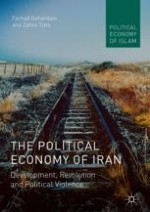2019 | OriginalPaper | Buchkapitel
5. Formation of Unstable Coalitions
verfasst von : Farhad Gohardani, Zahra Tizro
Erschienen in: The Political Economy of Iran
Aktivieren Sie unsere intelligente Suche, um passende Fachinhalte oder Patente zu finden.
Wählen Sie Textabschnitte aus um mit Künstlicher Intelligenz passenden Patente zu finden. powered by
Markieren Sie Textabschnitte, um KI-gestützt weitere passende Inhalte zu finden. powered by
Abstract
“if the thing doesn’t work out, I can always leave!” If you reach an impasse, you can say: OK, I’m leaving the game, I’m stepping out! Let’s start again with another game!
